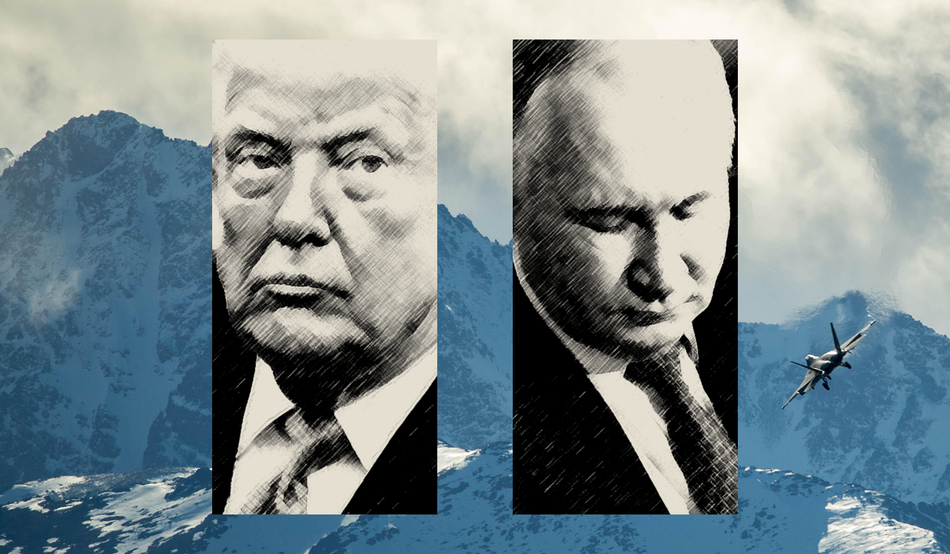When I heard that Donald Trump and Vladimir Putin were to meet in Alaska, the first thing that sprang to mind was a humorous kolomyika—a sort of Ukrainian answer to the limerick—that I grew up with:
“A Hutsul asked the Lord above for just a little grace:
That Moscow choose Alaska to take Crimea’s place.”
Like its literary cousin, the kolomyika is named after a place—Kolomyia, the beating heart of Hutsul culture in the Ukrainian Carpathians. Thanks to my father, I’m half-Hutsul and wholly steeped in that rich, riotous heritage, complete with its satirical verse.
The Carpathians are about as far from the front line as you can get in Ukraine. Western regions of the country are deemed so “safe” these days that UK authorities have begun rejecting asylum applications from Ukrainians on the grounds that they could resettle there. Yet earlier this year, my father’s ancestral home—the same one where I heard my first kolomyika, located deep in the Carpathians—was destroyed in a missile strike. The barn was torn to splinters; the house damaged beyond repair. It’s a miracle that my cousin and his young son survived.
They’re not the only members of my family directly affected by this war: another cousin is missing in action, several are still fighting, a few branches of the family have been displaced since 2022, and my brother was killed in action in 2017 defending the very land that is being used as a bargaining chip today. We are a western Ukrainian family, but our lives, and deaths, are entangled with the fate of our entire country. My family’s story is not uncommon. There’s barely a household in Ukraine that hasn’t had someone fighting, injured or killed during the 11 years of Russia’s war. A popular Ukrainian meme says: “My comfort zone is 603,548 km²”—superimposed on a map of Ukraine. The whole of it, Crimea included.
When Trump spoke of swapping territories, I couldn’t help but wonder: could the Hutsul’s prayer be answered at last? Could Crimea—and the other occupied parts of Ukraine—be swapped for Alaska? After all, by the Kremlin’s “once Russian, always Russian” logic, Alaska should be just as ripe for “liberation” as any of its former imperial possessions in Europe. By the time Russia seized Crimea in the late 18th century, the process of colonisation had already started in Alaska. It was sold to the United States only in 1867. And in today’s marketplace geopolitics, what’s been bought once, theoretically, can be sold again.
It sounds absurd, of course. But it’s no more absurd than the idea of swapping Ukrainian land for Ukrainian land. Not only would such a deal be unconstitutional, but it would ignore that this is not only about “territory”; it is about our homes and orchards, riversides holding childhood memories and cemeteries holding ancestral graves. On this territory, there are mass graves filled with our fellow citizens, and fields that once grew wheat but are now sown with landmines. All of this is ours by law and by moral right. It is not for trading.
The Alaska summit won’t go down in history as a “Munich 2.0”. That ship sailed out into the Black Sea in 2014, when Crimea was seized and the world barely blinked. The Alaska Summit will likely be swiftly forgotten as yet another episode in a geopolitical sitcom starring a property developer and a war criminal, which we’ve all been subjected to for some months now. Putin’s war goals have not changed: he is not seeking peace; he is seeking the destruction of Ukraine. Even a truly skilled dealmaker is not going to make a peace deal where none is to be made.
If this summit does make it into the history books, it will be remembered as an act of great betrayal. Europe, however, need not be complicit. Every inch of Ukrainian land is European land—and it is our shared duty to defend it. Those in occupied territories who are coerced into taking Russian passports, denied basic freedoms, subjected to abductions and torture, and see their children “re-educated” to become Russian patriots and future soldiers in the next wave of imperial violence—their fate is our shared responsibility too.
Every generation of my family was made to change its citizenship—sometimes more than once—without so much as leaving their own street. It is the grim destiny of a stateless people, whose land is treated as a buffer zone and passed from ruler to ruler. But that is in the past. Ukraine has been a sovereign state for more than 30 years, tested by political upheavals from within and by violence brought from without. Our independence is fuelled by something many in the west may find hard to grasp: the fierce sense of ownership over one’s country, which comes with the duty to defend it.
As the Alaska meeting à deux shows, Ukrainians have been excluded from negotiations over their own future once again. Yet they will be the ones making the decision whether to fight for their sovereignty. And if history has told us anything, they will fight on. The question is how much harder, longer and bloodier that fight will be if they are once again abandoned by a world that still likes to call itself democratic. If Ukraine is forcibly partitioned, Putin won’t stop there, and many more Crimeas will follow—and who knows, the “liberation” of Alaska might no longer be the stuff of a humorous verse.









